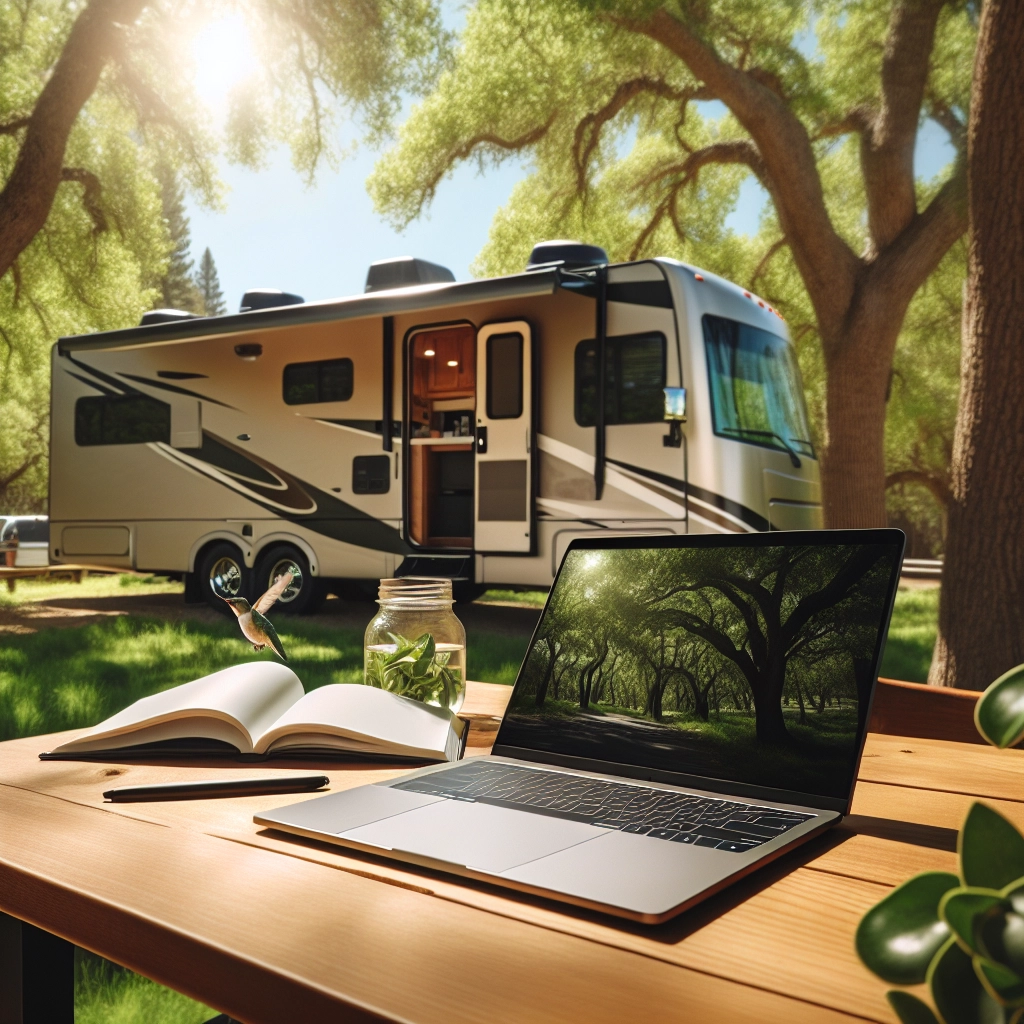Table of Contents

Key Considerations for Choosing the Right RV Solar System Battery
When you’re gearing up for the freedom of the open road with your RV, ensuring you have a reliable power source is crucial. Selecting the right solar system battery isn’t just about price; it’s about matching your travel needs with the right technology. Let’s talk about what really matters when choosing your RV’s solar battery.
Capacity and Power Requirements
Think of your battery as the heart of your RV’s solar power system. It needs to be strong enough to keep everything running smoothly. The capacity of your battery dictates how much power it can store, which translates to how long you can enjoy your appliances and gadgets without a recharge. Here’s the simple truth: more capacity means more freedom.
- Assess the wattage of your appliances.
- Calculate your daily power usage.
- Choose a battery with a capacity that can handle your consumption.
- Consider future upgrades – you might want more capacity later on.
- Look for batteries that offer a balance between capacity and affordability.
Charging Efficiency and Rate
Your solar panels are only as good as the battery that stores their power. A battery with high charging efficiency converts more of the sun’s energy into usable electricity. Faster charging rates mean less time waiting and more time exploring.
Here’s a quick tip: Opt for batteries with built-in Battery Management Systems (BMS) to optimize charging efficiency and protect against overcharging.
- Check the battery’s maximum charging rate.
- Ensure your solar array can provide enough power to charge efficiently.
- Remember, a faster charge rate can save the day when sunlight is limited.
Depth of Discharge and Cycle Life
Depth of Discharge (DoD) is a fancy term for how much of your battery’s capacity has been used. The higher the DoD, the less juice left in the tank. But here’s the kicker: regularly deep discharging can shorten your battery’s life. You’ll want a battery that offers a long cycle life and can handle deeper discharges without throwing in the towel.
“A good quality battery may offer up to 80% DoD while still maintaining a long cycle life. This means more usable energy and less worry about running out of power.”
Climate and Temperature Tolerances
RV adventures don’t stop for a little weather, and neither should your battery. Extreme temperatures can be tough on batteries, but the right choice can handle the heat – and the cold. Look for batteries that boast a wide operating temperature range to keep you powered year-round.
- Check the temperature range in the battery specifications.
- Consider insulated battery boxes for added protection.
- Remember, batteries perform best in moderate temperatures.
Weight and Size Constraints in an RV
Space is a premium in an RV, and every pound counts. You want a battery that fits snugly into your layout without weighing you down. Lithium batteries often offer the best power-to-weight ratio, but make sure the dimensions work with your setup.
- Measure your available space before you buy.
- Compare the weight of different battery types.
- Factor in the ease of installation and maintenance access.
Leading RV Solar Batteries for Reliable Off-Grid Power
Now that we’ve covered the essentials, let’s explore some of the top players in the RV solar battery game. These brands have been road-tested and proven to deliver the goods when you’re miles from the nearest plug.
- Battle Born Batteries – Known for their quality lithium options.
- Renogy – Offers a solid range of AGM and lithium batteries.
- Weize – A budget-friendly choice without skimping on performance.
- Victron Energy – A top-tier brand for those who want the best.
- Samsung SDI – Brings innovative technology to your RV’s power system.
- Tesla Powerwall – For RVers looking to go all out on storage capacity.
- Goal Zero – Portable solutions that are perfect for smaller setups.
Each of these brands has something special to offer, whether it’s cutting-edge technology, exceptional value, or just rock-solid reliability. The key is to find the one that aligns with your RV lifestyle and power needs.
Benefits of Lithium-Ion Batteries for RV Use
Lithium-ion batteries are the new kids on the block in the RV world, and they’re making a big splash. They’re lighter, they charge faster, and they last longer. Plus, they can handle deep discharges without batting an eye. Here’s the lowdown on why they’re a game-changer:
- Longer lifespan – They can last for thousands of cycles.
- More usable capacity – You can use up to 80-100% without harming the battery.
- Fast charging – Get back to full power quicker than traditional batteries.
- Lightweight design – Ideal for keeping your RV agile on the road.
- Low maintenance – No need for watering or regular check-ups.
Top Performer: Battle Born LiFePO4 Deep Cycle Battery
Battle Born Batteries are the cream of the crop when it comes to powering your RV. Their LiFePO4 Deep Cycle Battery is a standout, offering reliability and peace of mind. It’s built to last, with a 10-year warranty that’s as solid as the battery itself. Here’s why RVers love Battle Born:
- 100 amp-hour capacity – Plenty of power for all your needs.
- Built-in BMS – Protects against overcharging and deep discharge.
- Green energy – Non-toxic and renewable, for an eco-friendly journey.
- USA-made – Quality you can trust, with stellar customer service.
Best for Budget: Weize 100Ah LiFePO4 Battery
If your wallet is feeling a little light, but you still want lithium performance, Weize has got you covered. Their 100Ah LiFePO4 Battery hits that sweet spot of affordability and reliability. It’s proof that you don’t have to break the bank to get into the lithium game. Check out these perks:
- Cost-effective – Get lithium benefits without the hefty price tag.
- Decent lifespan – It’ll keep you powered for years to come.
- Compatibility – Works well with most solar setups.
- Lightweight – Easy to handle and install, even if you’re going solo.
Advantages of AGM Batteries for Solar Systems
AGM batteries have been the go-to for solar systems for years, and for good reason. They’re durable, they’re reliable, and they don’t mind a bit of rough treatment. They’re like the trusty old truck that never lets you down. Here’s what makes AGM batteries a solid choice:
- No spills, no fuss – Sealed design means no leaks and no maintenance.
- Good bang for your buck – More affordable than lithium with decent performance.
- Resilient – They can take a beating and keep on ticking.
- Versatile – Suitable for a range of climates and conditions.
Renogy AGM: A Longstanding Favorite Among RVers
Renogy is a name that’s synonymous with solar power, and their AGM batteries are a testament to their reputation. Renogy AGM batteries offer a mix of performance and value that’s hard to beat. They’re a favorite among RVers for these reasons:
- High discharge rate – Power-hungry appliances are no problem.
- Long life – Get years of service with proper care.
- Wide temperature range – They’ll perform in the heat and the cold.
- Renogy’s customer service – They’ve got your back if you need help.

Comparative Analysis of Prominent RV Battery Brands
With so many brands vying for your attention, it can be tough to know which battery is the best fit for your RV. Let’s put some of the top contenders side by side to see how they stack up. It’s like a showdown at high noon, but with batteries.
Head-to-Head Brand Comparison
When you’re comparing brands, it’s not just about the specs. It’s about how those specs translate to real-world use. Battle Born’s LiFePO4 offers top-tier performance and lifespan, while Weize’s budget-friendly option brings lithium power within reach. Renogy’s AGM batteries balance cost and capability for those who prefer a traditional option. Here’s a quick rundown:
| Brand | Type | Lifespan | Cost | Weight | Capacity |
|---|---|---|---|---|---|
| Battle Born | LiFePO4 | Long | Higher | Light | High |
| Weize | LiFePO4 | Good | Lower | Light | Good |
| Renogy AGM | AGM | Good | Moderate | Heavy | Moderate |
Remember, the best battery for you depends on your specific needs and how you use your RV. Whether you’re a weekend warrior or a full-time nomad, there’s a battery out there that’s the perfect fit for your solar setup.
Customer Satisfaction and Warranty Offers
When it comes to RV solar batteries, a warranty isn’t just a piece of paper; it’s a promise. It’s a brand’s way of saying, “We’ve got your back.” So, before you commit to a battery, take a good look at the warranty. A longer, more comprehensive warranty is a sign of a brand’s confidence in their product. And don’t just take the manufacturer’s word for it; see what other RVers are saying. Happy campers tend to share their stories, and those stories can be gold when you’re making your choice.
- Look for warranties of at least 5 years – that’s industry standard for quality batteries.
- Read reviews and testimonials for real-life experiences.
- Consider the brand’s reputation for honoring their warranty claims.
- Check if the warranty covers both residential and commercial use.
Innovative Technologies and Brand Reliability
Innovation is the name of the game in solar technology. The best brands are always pushing the envelope, bringing new features and better performance to the table. Whether it’s advancements in lithium technology or smarter BMS systems, these innovations can make a real difference in your RV life. But, innovation must go hand-in-hand with reliability. A brand that’s been around the block, with a track record of solid products, is a brand you can trust.
- Seek out brands that invest in research and development.
- Watch for new features that increase safety and efficiency.
- Balance cutting-edge tech with proven track records.
- Consider brands that specialize in RV solar power systems.
Value for Money and Overall Investment
Let’s talk turkey. A solar battery for your RV is an investment, and like any investment, you want the best return. Value for money isn’t just about the cheapest option; it’s about getting the most bang for your buck over the life of the battery. Factor in longevity, performance, and how the battery will fit into your RV lifestyle. A higher upfront cost might sting, but if it means more freedom and fewer headaches down the road, it’s worth every penny.
“Investing in a high-quality battery can save you money in the long run through fewer replacements and more reliable performance.”
Setting Up Your RV Solar Battery for Optimal Performance
Alright, you’ve got your shiny new battery. Now let’s make sure it’s set up to give you its best. Proper installation and maintenance are key to getting the most out of your investment. Follow these tips, and you’ll be on the road to energy independence.
Installation Best Practices
Installing your battery correctly is crucial for safety and performance. Always follow the manufacturer’s guidelines. If you’re not confident in your electrical skills, don’t be shy about calling in a professional. Secure the battery in a spot that’s accessible for maintenance, protected from the elements, and away from heat sources. And make sure all your connections are tight and corrosion-free.
- Use the right size cables and fuses for your system.
- Keep the battery area well-ventilated to prevent overheating.
- Mount your battery securely to prevent movement during travel.
Maintenance and Care for Extended Battery Life
Even the best batteries need a little TLC to keep them at their peak. For AGM batteries, that means keeping them charged and avoiding deep discharges. For lithium batteries, it’s all about not exposing them to extreme temperatures and keeping them clean. Regular check-ups can catch small issues before they become big problems, saving you time and money in the long run.
- Check your battery’s terminals periodically for corrosion or looseness.
- Keep an eye on the charge levels, especially during storage periods.
- Follow the manufacturer’s guidelines for cleaning and care.
Monitoring Systems and Tools for Battery Health
Knowledge is power, especially when it comes to your RV’s battery health. A good monitoring system can give you real-time insights into your battery’s performance and state of charge. This means you can make smart decisions about energy use and catch potential issues early. Look for systems that offer detailed data and are easy to use. A little bit of monitoring can go a long way toward extending your battery’s life.
- Invest in a quality battery monitor that provides accurate readings.
- Consider monitors that allow for remote access via smartphone or tablet.
- Use monitoring tools to track your energy consumption patterns.
Troubleshooting Common Battery Issues
Even the best RV solar batteries can hit a bump in the road. Knowing how to troubleshoot can save you from a lot of headaches. If your battery isn’t holding a charge, first check your connections. Loose or corroded terminals can wreak havoc on power flow. If the battery is draining too fast, consider if you’re overloading the system. Balancing your energy use with your battery’s capacity is key.
- Check connections for tightness and cleanliness.
- Test the battery voltage to ensure it’s charging properly.
- Balance your power usage with the battery’s capacity.
- Inspect the battery for any physical damage or swelling.
- Consult your battery’s manual for specific troubleshooting steps.

Real-World User Experiences with RV Solar System Batteries
There’s no substitute for real-world experience. Hearing from fellow RVers about their solar battery setups can provide invaluable insights. These stories shine a light on what works, what doesn’t, and how to make the most of your solar power system.
Case Studies: Success Stories and Lessons Learned
Take Mark and Sarah, for instance, who upgraded to a lithium battery system. They found that despite the higher upfront cost, their energy independence skyrocketed. They could boondock for days without worrying about power. But they also learned the importance of a proper charging setup to maximize their battery life.
- Mark and Sarah’s lithium upgrade allowed for longer boondocking.
- They invested in a robust solar panel array to keep their batteries topped up.
- Proper battery sizing was crucial for their energy needs.
Community Recommendations and Top Picks
The RV community is a treasure trove of knowledge. When it comes to top picks for solar batteries, lithium options like Battle Born and Renogy are often praised for their performance. For those on a tighter budget, AGM batteries from brands like Weize offer a great balance of cost and capability.
- Battle Born’s LiFePO4 batteries are a favorite for their longevity.
- Renogy’s lithium and AGM batteries are praised for their reliability.
- Weize AGM batteries are recommended for those watching their wallet.
Upgrading Older Systems with Modern Batteries
Upgrading your old battery system can feel like giving your RV a new lease on life. Modern lithium batteries are more efficient, charge faster, and last longer. If you’re moving from AGM to lithium, make sure your charging system is compatible. You might need a new charge controller to get the most out of your upgrade.
- Check compatibility with your existing solar panels and charge controller.
- Consider the long-term savings and efficiency gains with lithium.
- Upgrade in stages if budget constraints are an issue.
FAQs: Everything You Wanted to Know About RV Solar Batteries
Got questions? You’re not alone. Here are some of the most common queries about RV solar batteries, answered in plain English.
How do I calculate the capacity I need for my RV solar battery?
Calculating the capacity you need is simpler than it sounds. Start by adding up the wattage of all the devices you use. Multiply that by the number of hours you use them each day. That gives you your daily watt-hour requirement. Divide that number by the voltage of your system (usually 12V) to get the amp-hours (Ah) you’ll need. Always add a buffer of about 20% to ensure you don’t come up short.
– List all devices and their wattage.
– Calculate daily usage in watt-hours (Wh).
– Convert Wh to Ah with a simple division by your system voltage.
– Add a 20% buffer to the total Ah to cover unexpected energy needs.
Can I mix different types of batteries in my solar setup?
Let’s cut to the chase: mixing different types of batteries is like inviting cats and dogs to the same party – it’s not a great idea. Different batteries have different charging and discharging characteristics, and mixing them can lead to reduced performance and even damage. Stick with one type to keep your solar system running smoothly.
– Use batteries of the same type, capacity, and age for best results.
– Mismatched batteries can lead to imbalanced charging, reducing efficiency.
– If upgrading, replace all batteries at once to maintain system harmony.
How often should I replace my RV solar system battery?
The lifespan of your battery depends on how you treat it. A well-cared-for lithium battery can last you a good decade, while AGM batteries might tap out after five to seven years. Keep an eye on your battery’s performance, and when it starts to decline, it’s time to think about a replacement. Regular maintenance can stretch that time out, so don’t skimp on the TLC.
– Monitor your battery’s performance and capacity over time.
– Expect to replace AGM batteries every 5-7 years, lithium every 10 years or more.
– Proper maintenance can extend the life of your battery.
Is it cost-effective to upgrade to a lithium battery for my RV?
Upgrading to lithium might feel like a big leap, but it’s a leap worth taking. Yes, the upfront cost is higher, but the long-term benefits – longer lifespan, higher efficiency, lighter weight – make it a smart investment. You’ll save on replacement costs, and the performance boost is something you’ll notice every day.
– Regularly check connections and clean terminals to prevent corrosion.
– Keep batteries charged, especially during storage periods.
– Follow manufacturer guidelines for specific maintenance tasks.
– Avoid exposing batteries to extreme temperatures.
And there you have it, folks – the ins and outs of choosing and using RV solar system batteries. Whether you’re a seasoned RVer or just starting out, the right battery can make all the difference in your off-grid adventures.
Remember, it’s not just about the journey or the destination – it’s about the freedom to power your dreams, no matter where you park. With the right solar battery, the world is your campsite. So charge up, hit the road, and let the sun guide you to your next great adventure.
- Boondocking RVs: Flexible Solar Solutions – 3 March 2024
- Renewable Energy Tips for Full-Time Boondocking RVers – 2 March 2024
- Boondocking Solar Power Systems: Sizing Options & Solutions for Motorhomes – 1 March 2024
